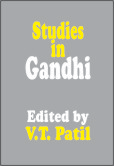Subtotal: 0.0
Preface
Mahatma Gandhi was one. of the giants of the 20th century, who left an indelible impact on the social, economic and political forces of the day. He was a great revolutionary who even while he fought for the freedom of his country, was aware of the freedom of all the enslaved people in different parts of the world. As an inconoclast he shook the foundations of the mighty British Empire in India through such novel techniques as non-violent satyal:;raha, fasting, hartals, non-cooperation and mass civil disobedience.
Gandhi was a muitifaceted genius who applied his mind to a large number of problems of human concern. His social ideas exemplify a deep and abiding interest in a fundamental reformation of the Indian society. Though he believed in the strategy of one step at a time yet through his imme`nse wisdom and the power of his. analytical reasoning he could provide root and branch solutions to some of the obnoxious social evils like untouchability, casteism etc. In the economic sphere, he fervently believed that the economic salvation of India depended upon the economic regeneration of vast millions of Indians living in the rural areas. In line with such a policy, he championed the cause of small scale village and cottage industries which could provide fruitful employment on a
-continuing basis to the simple people living in rural areas. At the political level, Gandhi believed that the state was an instrument of coercion. since it was likely to undermine the cherished fundamental freedoms of individuals. As an individualist par excellence, he believed that individuals could enrich their personalities through truth and non-violence, saturated with an atmosphere of freedom. Though Gandhi was a charismatic leader with mass appeal, yet he symbolised a new trend in the Indian context of an individual wielding imense power and influence on millions without occupying any formal positions of power and authority. He was not very much impressed by the doctrine of a majoritarian democracy since in his values every issue was judged from the touchstone of morality rather than in terms of numbers.
Mahatma Gandhi was a towering personality who contributed in a large measure to some of the highest values which Indians have stood for since the dawn of civilization. Physically, Gandhi appealed very frail, but he was a man of extraordinary courage, determination and pcrseverence in`the face of aC ersity. He had an original mind which probed into the matrix of human problems. His magnetic person-ality could command the loyalty of men and women of diverse tempera7 ments and differing intellectual endowment. It is not surprising that Gandhi expressed his views on a large number of subjects or issues, which in themselves constitute a voluminous body of Gandhian thought. Scholars have criticized or condemned Gandhi or they have strongly applauded his ideas in no uncertain terms., Uncritical adulation by placing Gandhi on a high pedestal or unreasoned condemnation or criticism have to be eschewed for an impartial evaluation of his contribution. But what is necessary is a scientific and systematic assessment of the theory and practice of Gandhi and his socio-economic and political impact and contemporary relevance. The papers presented in this volume seek to throw light on different dimensions of Gandhi`s contribution or bring to bear a new frame of reference or a conceptual analysis on some of the lesser known aspects in t,his field. Some of the papers bring out the contradictions in Gandhian thinking while others using a similar or different analytica:I apparatus clearly point out to the inherent coherence and unity in Gandhian thought and practice. In such a study, involving a wide range of authorship, different viewpoints and assessments are bound to occur. The various writers have very freely analysed and interpreted different aspects of the Gandhian phenomena, which has gone a long way in generating new ideas and new insights.
The editor is grateful to all the contributors for .. readily responding to contribute research papers for inclusion· in the study. The author also expresses his sense of gratitude and appreciation to his large number of friends and well-wishers f~r their friendly criticism and constant encouragement.


Please Login To Write A Review
Login